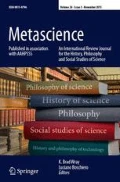Notes
Over the course of this (relatively brief) history, there has been a gradual change of terminology from nominalism to fictionalism to describe positions, such as Leng’s, that hold that (most) core mathematical claims are false because the entities they refer to do not exist.
One source of confusion is that we do sometimes use the term “explain” in cases where we are really describing. For example, I may explain where Naples is by referring to Italy as a boot.
For a good summary of Yablo’s views see Yablo (2005).
e.g. “[T]he supposed acausality of mathematical objects … [renders] the fictionalist’s proposed attitude of acceptance more plausible than the constructive empiricist alternative” (201).
There is also arguably a fifth formulation of MND, where the MND claim is about “one’s ability to adopt, reasonably, the methods and expectations of modern science” (204).
For further discussion, see Baker (2003).
See Colyvan (1998) for a discussion of various problems with the Eleatic Principle.
“[T]he regularities that actually hold between non-mathematical objects might reasonably be expected to agree with the predictions of our mathematically stated empirical theories even if it is supposed that those theories have things completely wrong about the relations they posit to hold between the mathematical and non-mathematical objects they posit. After all, according to the fictionalist there may, for all we can know, be no mathematical objects …” (233–234).
Quotations in the first paragraph are from Blanchard (2002, 48).
Except perhaps the mathematics of the research frontier. We can bracket such cases, as they arise in virtue of the speculative nature of the research frontier.
References
Baker, A. 2003. Does the existence of mathematical objects make a difference? Australasian Journal of Philosophy 81: 246–264.
Baker, A. 2005. Are there genuine mathematical explanations of physical phenomena? Mind 114: 223–238.
Baker, A. 2009. Mathematical explanation in science. British Journal for the Philosophy of Science 60: 611–633.
Batterman, Robert W. 2002. The devil in the details: Asymptotic reasoning in explanation, reduction, and emergence. Oxford: Oxford University Press.
Blanchard, O. 2002. Macroeconomics, 3rd ed. Upper Saddle River, NJ: Prentice-Hall.
Burgess, J. 1998. Occam’s razor and scientific method. In Philosophy of mathematics today, ed. M. Schirn, 195–214. Oxford: Oxford University Press.
Burgess, John. 2010. Review of M. Leng, Mathematics and reality. Philosophia Mathematica. Advance Access.
Burgess, J., and G. Rosen. 1997. A subject with no object. Oxford: Oxford University Press.
Cartwright, N. 1983. How the laws of physics lie. Oxford: Clarendon Press.
Colyvan, M. 1998. Can the Eleatic principle be justified? Canadian Journal of Philosophy 28: 313–336.
Colyvan, M. 2001. The indispensability of mathematics. Oxford: Oxford University Press.
Colyvan, M. 2002. Mathematics and aesthetic considerations in science. Mind 111: 69–74.
Colyvan, M. 2010. There is no easy road to nominalism. Mind 119: 285–306.
Dorr, C. 2010. Of numbers and electrons. Proceedings of the Aristotelian Society 110: 133–181.
Frigg, R. 2010. Models and fiction. Synthese 172: 251–268.
Kline, M. 1972. Mathematical thought from ancient to modern times. New York: Oxford University Press.
Koellner, P. 2009. Truth in mathematics: The question of pluralism. In New waves in the philosophy of mathematics, ed. O. Bueno, and Ø. Linnebo, 80–116. Basingstoke: Palgrave Macmillan.
Lavers, G. 2010. Review of M. Leng, Mathematics and reality. Notre Dame Philosophical Reviews 2010.09.11.
Maddy, P. 1992. Realism in mathematics. Oxford: Clarendon Press.
Maddy, P. 2011. Defending the axioms: On the philosophical foundations of set theory. Oxford: Oxford University Press.
Melia, J. 2000. Weaseling away the indispensability argument. Mind 109: 455–479.
Melia, J. 2002. Response to Colyvan. Mind 111: 75–80.
Paseau, A. 2007. Scientific Platonism. In Mathematical knowledge, ed. M. Leng, A. Paseau, and M. Potter, 123–149. Oxford: Oxford University Press.
Pincock, C. 2012. Mathematics and scientific representation. New York: Oxford University Press.
Putnam, H. 1971. Philosophy of logic, reprinted in his Mathematics matter and method: Philosophical papers, vol. 1, 323–357, 2nd edition. Cambridge: Cambridge University Press, 1979.
Rizza, D. forthcoming. Magicicada, mathematical explanation and mathematical realism. Erkenntnis.
Saatsi, J. forthcoming. The enhanced indispensability argument: Representational versus explanatory role of mathematics in science. British Journal for the Philosophy of Science.
Toon, A. 2010. The ontology of theoretical modelling: models as make believe. Synthese 172: 301–315.
Yablo, S. 2005. The myth of the seven. In Fictionalism in metaphysics, ed. M. Kalderon, 88–115. New York: Oxford University Press.
Wayne, A. 2011 (forthcoming). Expanding the scope of explanatory idealization. Philosophy of Science.
Author information
Authors and Affiliations
Corresponding author
Rights and permissions
About this article
Cite this article
Pincock, C., Baker, A., Paseau, A. et al. Science and mathematics: the scope and limits of mathematical fictionalism. Metascience 21, 269–294 (2012). https://doi.org/10.1007/s11016-011-9640-3
Published:
Issue Date:
DOI: https://doi.org/10.1007/s11016-011-9640-3

